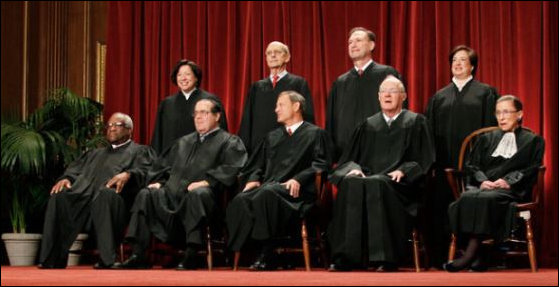
In a five-to-four vote, the U.S. Supreme Court derailed, at least temporarily, President Obama’s Clean Power Plan. Regulatory uncertainty ensues.
by James A. Bacon
The U.S. Supreme Court has halted implementation of the Clean Power Plan until challenges to its constitutionality can be resolved, creating uncertainty at the state level, including here in Virginia, on how to proceed.
The high court gave no explanation for its stay, but foes of the plan, which would compel electric power companies to make major cuts to CO2 emissions by 2030, argued that it would “force massive … changes in terms of state policies and resources, power plant shutdowns, and investments in wind and solar power,” which could not be reversed if it were later declared unconstitutional.
As a practical matter, the decision will delay implementation of the plan until the next administration. A federal appeals court is not expected to hear the case until June. If the case were appealed again, the Supreme Court likely could not render a decision until 2017, reports the Washington Post. While a Democratic president probably would press on with the plan, a Republican president likely would reverse it even if the Supreme Court ruled it to be constitutional.
The stay could create a dilemma for the McAuliffe administration, which supports the plan and has been working to implement it. Under the Clean Power Plan, Virginia’s Department of Environmental Quality is required to submit a state plan by June 2016, with the possibility of an extension until June 2017, or June 2018 if it adopts a multistate plan.
The response here in Virginia is mixed.
“Today’s unfortunate decision by the Supreme Court hits pause on the country’s strongest action to lower harmful carbon pollution, but it won’t stop the massive shift to cleaner, cheaper energy already underway in the Southeast and across the nation,” says Frank Rambo, senior Attorney and clean energy leader for the Southern Environmental Law Center. “The goals of the Clean Power Plan reflect this energy shift: we’re embracing cleaner energy options that would be happening with or without this plan. ”
“This comes as no real surprise,” says Dominion Virginia Power spokesman David Botkins. “It continues to be a legal and policy cloud of uncertainty for the country and the energy industry.” But Dominion will continue to move forward with the Clean Power Plan. “We will work constructively with the Commonwealth and other stakeholders on a compliance plan that has our customers as the first priority, ensures reliability, and maintains a diverse mix of electric generation. We continue to prepare for implementation (of CPP) unless we are notified that Virginia is delaying or halting their development process.”
What does this mean for green energy in Virginia?
While a stay of the Clean Power Plan will slow the transition of Virginia’s electric grid to cleaner energy sources, it will not halt it. Dominion still is planning to shut down two aging, coal-fired units at its Yorktown Power Station, and its long-term investment plan calls for more gas-fired electric power, which emits less CO2 per unit of electricity than coal, and more solar. Indeed, Dominion announced plans two days ago to partner in a 20 megawatt solar facility in Chesapeake that will produce the energy equivalent needed to power 5,000 homes. (Substantial reliance on offshore wind energy still seems to be a distant prospect.)
The economics of wind and solar continue to improve, and many energy consumers — ranging from Amazon Web Services to the Norfolk Naval Station here in Virginia — are willing to pay a premium for renewable energy. Meanwhile, expansion of the electric transmission grid may make it realistic for Virginia power companies to import cheap wind-powered electricity from the Midwest.
Update: I have updated the Dominion quote to reflect company’s assertion that it will continue to move forward with the Clean Power Plan.
Update: A statement from Governor Terry McAuliffe: “Over the last several months my administration has been working with a diverse group of Virginia stakeholders that includes members of the environmental, business, and energy communities to develop a strong, viable path forward to comply with the Clean Power Plan. As this court case moves forward, we will stay on course and continue to develop the elements for a Virginia plan to reduce carbon emissions and stimulate our clean energy economy.”
A quote from John Shepelwich, spokesman for Appalachian Power Co.: “The Supreme Court’s decision confirms that the legal justification for the Clean Power Plan should be examined by the courts before scarce state and private resources are used to develop state plans. The accelerated schedule for briefing and argument in the lower court assures that the case will be heard promptly.”


